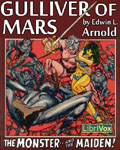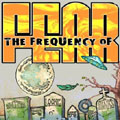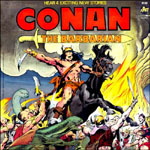
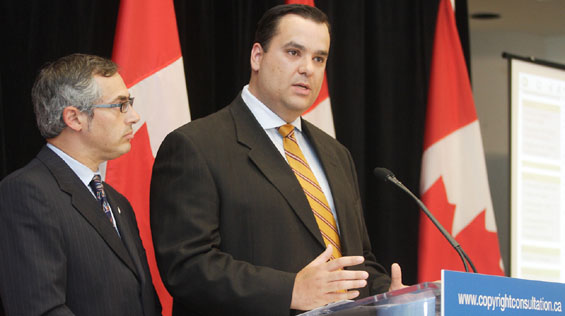
As you’re aware I’ve been following the Canadian Copyright Consultations run by Industry Minster Tony Clement and Heritage Minster James Moore. The most recent one, held in Toronto yesterday, was the most vehement of them all. The participants were heavily weighted towards music industry executives and lawyers (I counted at least 19 of them). They told us how badly their industry has been suffering and how their lawyers don’t have the legislation they need to deal with it. Execs from Sony Music Canada, Warner Music Canada and Universal Music Canada all spoke. Nearly all of them asked the minister to pass the ten year old WIPO treaties that make the breaking of DRM a copyright crime.
Several other non-music industry attendees brought up some non-music related points too. Most of these were not concerned about propping up a dying business model, but rather with how to prevent making criminals out of Canadians or how a new copyright law can address the new industries that technology allows. The librarians, for example, had some very serious concerns about the ability to provide services to patrons with any law that protects digital locks and lists statutory damages for their violation. A few others pointed out the problem of Crown Copyright [why don’t we just replace it with creative commons?]. Others insisted that the new copyright law, whatever its content, must be crystal clear and easy to understand – ‘spend some money on education’ – they said [this too is a great idea]. Several folks thought any new legislation should definitely address the problem of “fair dealing” [that we have no parody exemption in Canada is nuts]. A web commenter also suggested that because of the long response time, the current standard of getting permission from a copyright holder, was not-feasible for photocopied materials used in classrooms [this needs to be addressed by any new copyright bill]. And one of the smartest points was from a software guy who pointed out that a ‘retroactive term extensions doesn’t ‘encourage dead artist to create more work.’ It really needed to be said.
Below is a chronological sampling of some of the less representative comments (I’ve included just a few of the many music industry execs and lawyers who spoke). And, I’ve included one commenter’s speeches in full; Jonathan Dry’s words will really hit home with some of our readers in particular. I thought his comments were absolutely terrific.
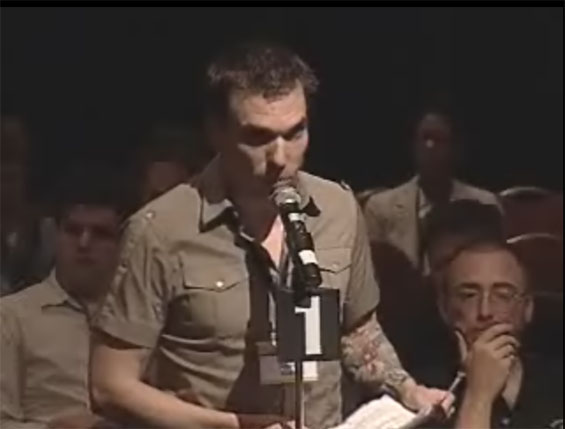
Jamie Kidd (jazz musician) – “my new album won’t be marketed in Canada”
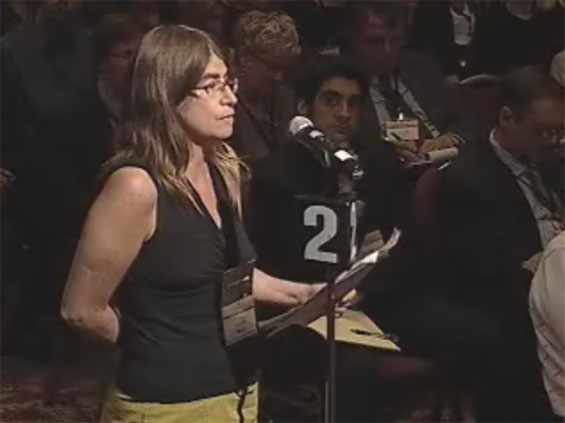
Martha Rans (outreach lawyer) – “return to Vancouver and hold a town hall”
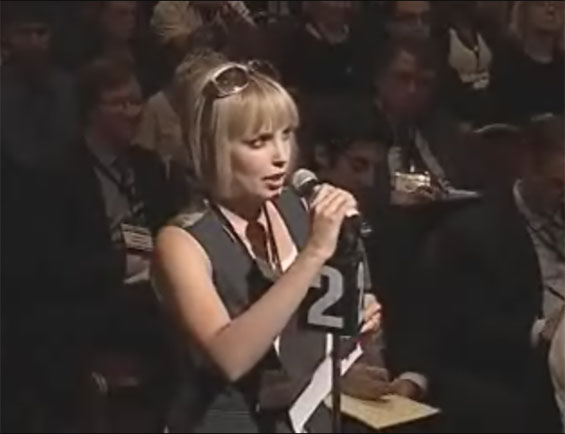
Sophie Milman (jazz artist) – “extend the copying levy to iPods”
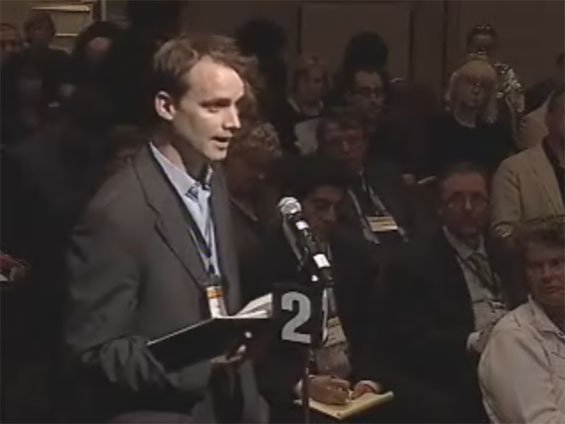
Dan Glover (lawyer) – “I make my living by copyright”
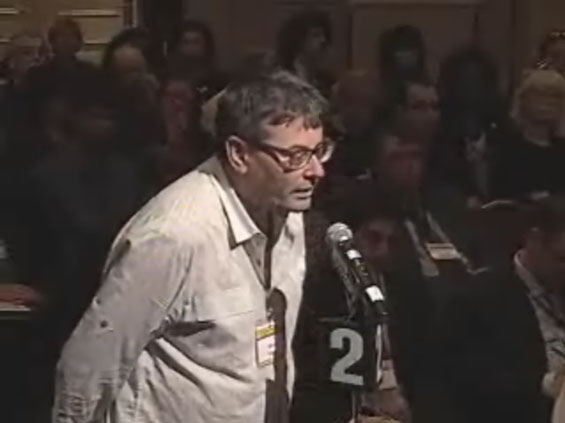 Steve Kane (President of Warner Music Canada since 2004) “When I began my tenure as President of President of Warner Music Canada we had about 180 employees. We currently have 85.” [woots from the crowd]
Steve Kane (President of Warner Music Canada since 2004) “When I began my tenure as President of President of Warner Music Canada we had about 180 employees. We currently have 85.” [woots from the crowd]
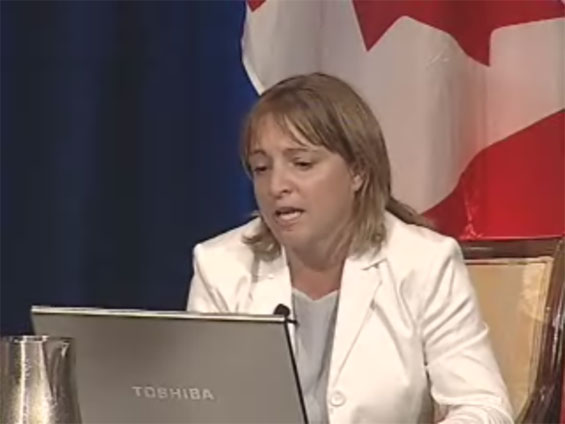
Sylvana (from the web) – “I’m appalled that Canada was recently placed on the U.S. piracy list along with such countries as China, Russia…” [Sylvana is likely referring to this article. I wonder if she read the follow up article by the same author that debunks it?]
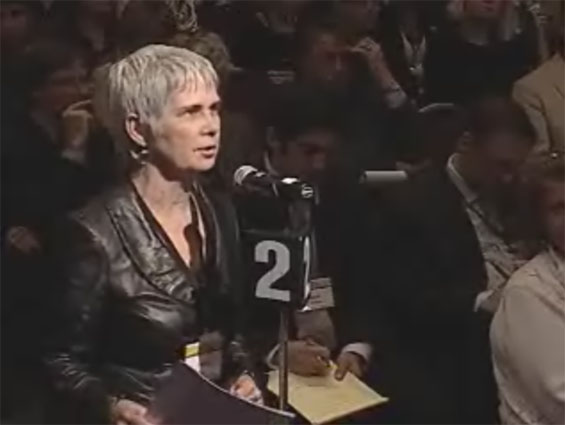
Leslie Weir (librarian @ University Of Ottawa) – “copyright law must not make it illegal to circumvent a digital lock”
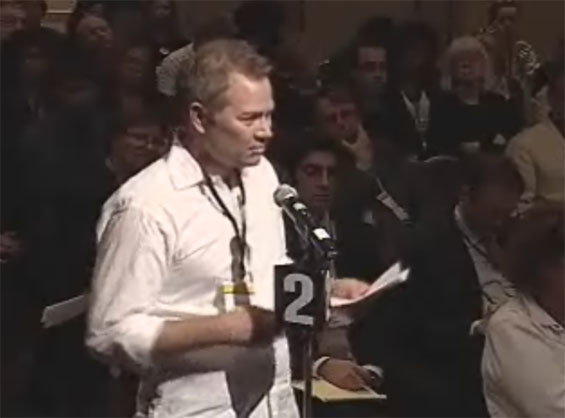
Rob Bolton (digital marketing manager @ Warner Music Canada) – “what we have in this country is truly a lawless society and it’s very difficult to build legitimate businesses here”
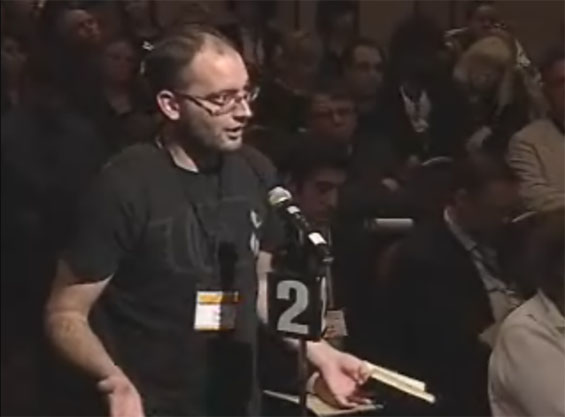
Paul Vett (BlackBerry software developer) – “it’d be nice to drop some of the rhetoric and focus on the nuances because it’s quite complicated”
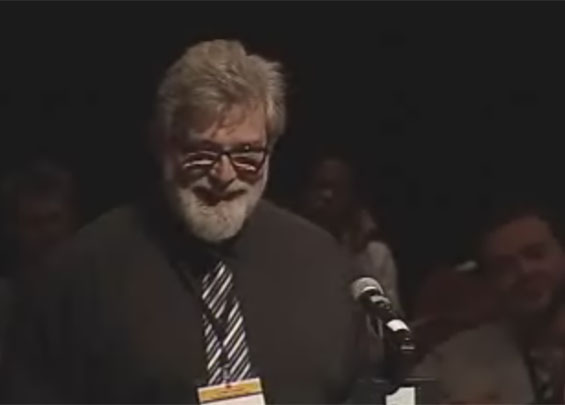
Brian Isaac (chairman of Canadian Anti-Counterfeiting Network, lawyer @ Smart & Biggar) – “I make my living enforcing intellectual property”
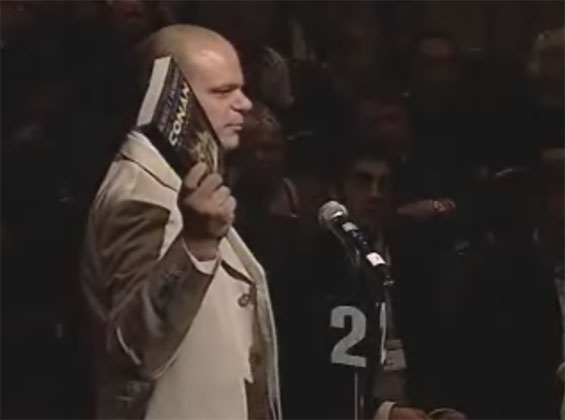
Jonathan Dry – (Mechanical Designer) –“I’m a mechanical designer from Mississauga. I don’t work in the entertainment industry. [audience claps] I believe we are in this situation because of eternal copyright laws. I’ll start by saying that copyright is meant to foster a broad and diverse culture of creation and derivative works in a country. And we don’t have that now. The eternal copyright has created a vacuum and pulled away the culture of the people from the general populace. I grew up in the 1990s, that was how it was then. In its place was placed a load of mass produced rubbish… music… you could turn on the TV any time [and hear it?]. It’s pretty much the same nowadays and this damages the youth. It takes away a formative decade, the teenage years. Instead of creating a culture of production and of personal achievement we’re given self destructive teenage rebellion. We’ve put all the power to create culture into the hands of a few corporations with eternal copyright. They just buy it up and that’s the end of it.
If we’re going to reform the system… [looks at the timer] three minutes… Okay. As far as the public domain goes we need shorter copyright terms. [points to the timer] Thank you. [moderator offers an apology]
This book [holds up Blood Of The Gods and Other Stories] is published in Mississauga, Ontario. It is by Robert E. Howard. His work is falling into the public domain. [holds up The Coming Of Conan The Cimmerian] He is most known as the creator of Conan The Barbarian. If you like books about screaming barbarians and monsters it’s great stuff. There’s a publishing boom going on, of his work, right now. Del Rey [has] his stuff with annotations, scholarship, letters, all sorts of other stuff – because everything else, the original stories, are now in the public domain. And guys like these guys in Mississauga [indicates Blood Of The Gods] are publishing it. It’s being driven by the entrance of his work into the public domain.
What we need is shorter copyright terms. This is going to drive innovation. Canada could attract a large number of publishers and artists from all over the world if we reduce copyright terms. We are sitting on a gold mine people. It’s being withheld from the general public by a small amount of copyright holders. If we were to loosen that up there would be a cultural explosion and industrial explosion in that industry. I would ask that the Conservative government to go back to your entrepreneurial roots. We have a small publisher in Mississauga making money from the public domain, it’s also driving big ones in the states.
[points to audience member] – no interruptions please. Okay?
We need to go back and allow these entrepreneurial companies, these small startups, to grow big. To exist! Because, right now, they can’t.”
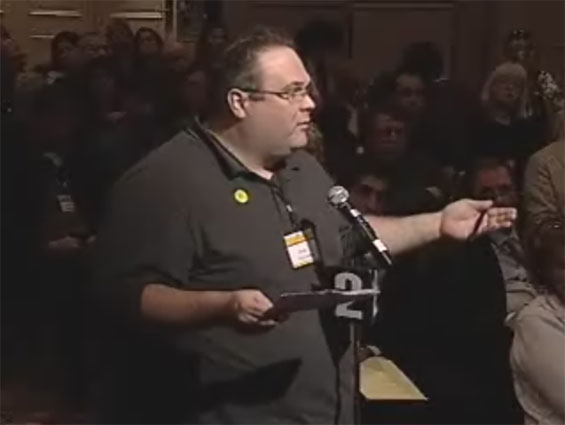 Denis McGrath (TV writer and blogger) – “as an artist I want my work to be seen by as many people as possible”
Denis McGrath (TV writer and blogger) – “as an artist I want my work to be seen by as many people as possible”
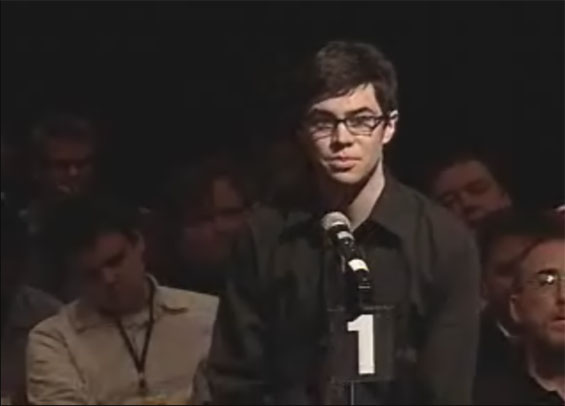 Daniel Seyer (student at University Of Ontario Institute of Technology)- “hello music industry” [audience laughs] I’m a student… [audience member says something] “Hello entertainment industry I guess. It’s nice for everyone to be here” – “keep the playing field open and let the market decide” – “extend tariffs [levies] to hard drives and blank media” – “put a tax on bandwidth” – “don’t do anything that the Americans are doing” [audience laughs]
Daniel Seyer (student at University Of Ontario Institute of Technology)- “hello music industry” [audience laughs] I’m a student… [audience member says something] “Hello entertainment industry I guess. It’s nice for everyone to be here” – “keep the playing field open and let the market decide” – “extend tariffs [levies] to hard drives and blank media” – “put a tax on bandwidth” – “don’t do anything that the Americans are doing” [audience laughs]
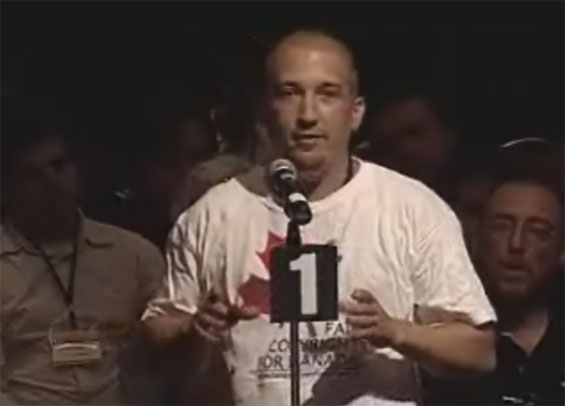 Simon Shaw [movie pirate wearing a Fair Copyright For Canada t-shirt] – “I operate six terabyte servers of movies that I share freely with my friends all around the world. Most of your works are on my servers”
Simon Shaw [movie pirate wearing a Fair Copyright For Canada t-shirt] – “I operate six terabyte servers of movies that I share freely with my friends all around the world. Most of your works are on my servers”
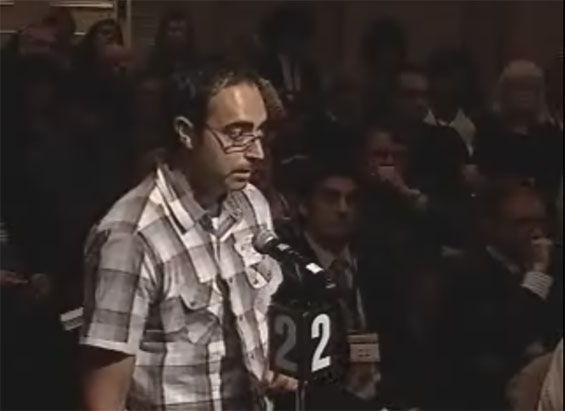
Speaker #143 (anonymous lawyer) – “The previous speaker mentioned this was ‘not a debate about two extremes’ I take offense to that. … On the one hand we continue to be the laughing stock of the world through our outdated copyright laws, and continue to be a cesspool for online pirates such as the last speaker [woots and claps from the audience] or we update the copyright act as the rest of the modernized world has done to protect creator’s rights.”
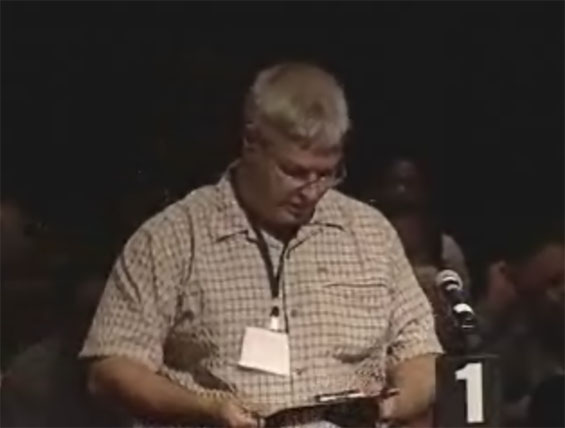
Speaker #43? or #93? (anonymous speaker) – [approaches the microphone] “…kinda funny how there’s so many people from the music industry here – not many normal people.” “The corporations are trying to extend copyright… [something someone in the audience flusters this speaker] …any Cinar executives here? – Ya? You guys never steal.”
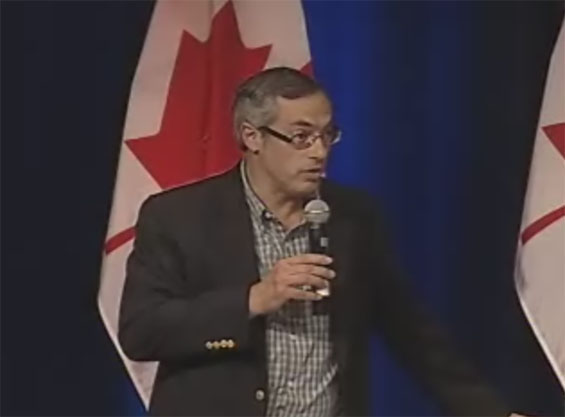
Tony Clement (Minister Of Industry) – “we got through it all in one piece. It has not degenerated into a U.S. health care town hall meeting”
Watch the whole video for yourself in the (very lame) |WMV| format.
Updates:
Posted by Jesse Willis



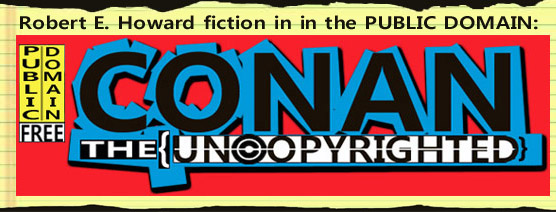
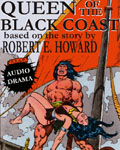
 Queen Of The Black Coast
Queen Of The Black Coast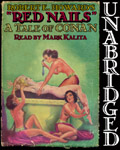

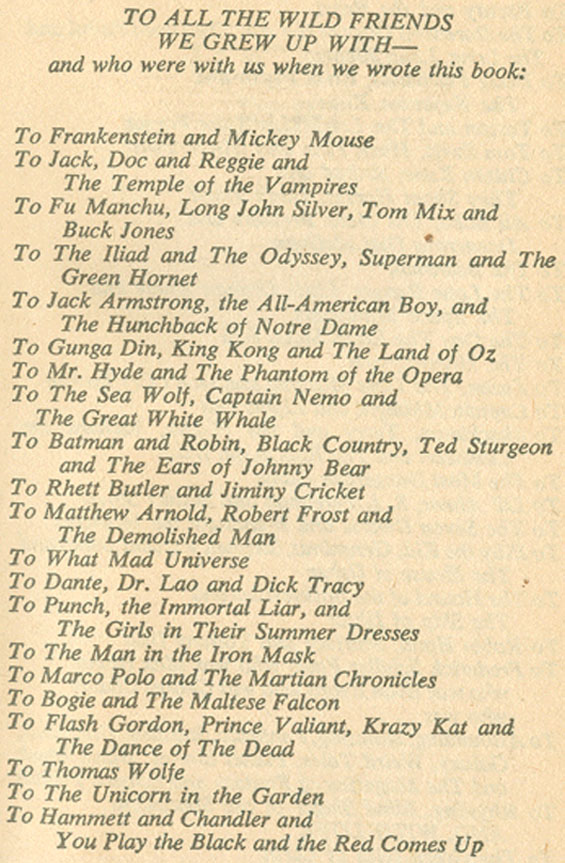
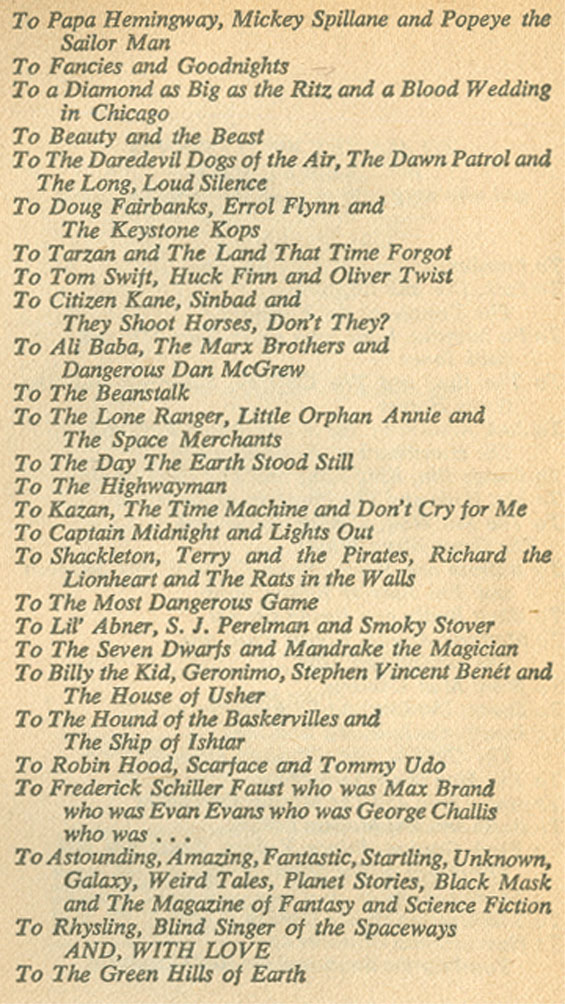
 First published as Lieutenant Gullivar Jones: His Vacation, in 1905, this novel is a precursor to, and the likely inspiration for, Edgar Rice Burroughs’s classic A Princess of Mars (1911). Despite my not having heard of it before now the novel has a long history of adaptation. Ace Books reprinted Arnold’s novel in paperback in 1964, retitling it Gulliver of Mars [sic]. A more recent
First published as Lieutenant Gullivar Jones: His Vacation, in 1905, this novel is a precursor to, and the likely inspiration for, Edgar Rice Burroughs’s classic A Princess of Mars (1911). Despite my not having heard of it before now the novel has a long history of adaptation. Ace Books reprinted Arnold’s novel in paperback in 1964, retitling it Gulliver of Mars [sic]. A more recent 